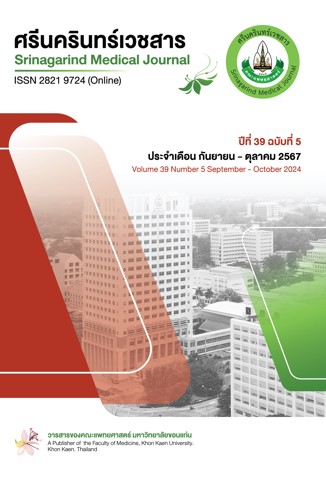Outcomes of Palliative Care Program on Caregiver’s Burden and Satisfaction in End-of Life Care among the Late Stage - Dementia Patients
Keywords:
late dementia patient, palliative care, caregiver' s burden, satisfaction of careAbstract
Background and Objectives: Late-stage dementia patients receiving palliative care are often complex cases requiring total care from caregivers. Consequently, caregivers experience fatigue due to the increasing care burden. This study aimed to assess the outcomes of a palliative care program for dementia patients, focusing on caregiver burden and satisfaction with end-of-life care
Methods: A retrospective study of medical records and care records profiles of 47 patients recruited from January 1 to December 31, 2022. The sample was selected using a purposive sampling. Descriptive statistics including mean, standard deviation and percentage, were used. A paired t-test was applied to compare the mean caregiver burden scores before and after the palliative care program.
Results: The 47 patients with dementia who participated in the palliative care program showed a significantly lower average caregiver burden score after the intervention compared to before (p < .05). Additionally, satisfaction with end-of-life care was evaluated, with results indicating high satisfaction (x̄ 3.773, Min 3.4 Max 4.0, SD 2.63).
Conclusion: Dementia patients who participated in the palliative care program received comfort care and died peacefully as needed with a very good level of nursing care.
References
Nichols E, Steinmetz JD, Vollset SE, Fukutaki K, Chalek J, Abd-Allah F, et al. Estimation of the global prevalence of dementia in 2019 and forecasted prevalence in 2050: an analysis for the global burden of Disease Study 2019. Lancet Public Health 2022;7(2):e105-e125. doi:10.1016/S2468-2667(21)00249-8.
Sontheimer N, Konnopka A, König HH. The excess costs of dementia: a systematic review and meta-analysis. J Alzheimers Dis 2021;83(1):333–54. doi:10.3233/JAD-210174
Ersek M, Joan G. Carpenter. Geriatric Palliative Care in Long-Term Care Settings with a Focus, 2013. doi:10.1089/jpm.2013.9474
Bureau of Information. News for social [Internet]. [cited November 1, 2023] Available from: http://pr.moph.go.th/iprg/include/admin_hotnew/show_hotnew.php?idHot_new=86580; 2017.
Karunruk Palliative Care Statistics Srinagarind Hospital. Statistical Center Annual Report. Srinagarind Hospital Faculty of Medicine Khon Kaen University, 2021.
Lukewich J, Tranmer J, Kirkland L, Walsh B. The Nursing Role Effectiveness Model: A framework for evaluating the impact of nursing on patient outcomes. J Nurs Manag 2019;27(8):1578-86. doi:10.1002/nop2.281
Silpakit O, Silpakit C, Chomchuen R. Psychometric study of the Thai version of Zarit Burden Interview in psychiatric caregivers. Journal of Mental Health of Thailand 2015; 23(1):12-23.
Siriket R, Piasupun P, Raksasataya A.Translation and reliability testing of the instrument satisfaction with palliative care for patients with end-of-life dementia. Srinagarind Med J 2022;37(5):533-8.
Allyn YM Hum, Wu HY, Noorhazlina B, Ali IYO, Chin JJ, Lee AOK, et al. The dignity in advanced dementia (DIAdEm) study: Developing an integrated geriatric palliative homecare program. Prog Palliat Care 2018;26(2):65-72. doi:10.1080/09699260.2018.1442286
Pereira MJ, Tay RY, Tan WS, De Castro Molina JA, Noorhazlina B, Leong IYO, et al. Integrated palliative homecare in advanced dementia: reduced healthcare utilisation and costs. BMJ Support Palliat Care 2023;13(1):77-85. doi:10.1136/bmjspcare-2019-002145
Downloads
Published
How to Cite
Issue
Section
License
Copyright (c) 2024 Srinagarind Medical Journal

This work is licensed under a Creative Commons Attribution-NonCommercial-NoDerivatives 4.0 International License.




